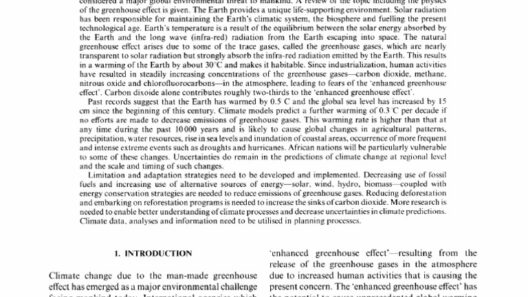The greenhouse effect is an intricate phenomenon that has garnered substantial attention in the discourse surrounding climate change and global warming. This natural process is essential for sustaining life on Earth; however, anthropogenic activities have exacerbated it, leading to detrimental environmental consequences. Understanding the causes of the greenhouse effect is crucial to addressing the broader implications of global warming.
In essence, the greenhouse effect occurs when certain gases in the Earth’s atmosphere trap outgoing heat, preventing it from escaping into space. This retention of heat is akin to the way a greenhouse retains warmth, hence the name. The primary gases responsible for this effect include carbon dioxide (CO2), methane (CH4), nitrous oxide (N2O), and fluorinated gases. Each contributes to global warming in unique ways, leading to an escalating spiral of environmental degradation.
Examining the individual contributors to the greenhouse effect is essential for comprehending their collective impact on global temperatures.
From our fossil fuel dependency to deforestation, various human activities contribute significantly to greenhouse gas emissions.
Fossil Fuel Combustion: The Major Culprit
One of the most pressing causes of the greenhouse effect is the combustion of fossil fuels. This process releases a staggering amount of CO2 into the atmosphere, with power plants and vehicles being the largest contributors. When coal, oil, and natural gas are burned for energy, they undergo a chemical reaction that releases carbon dioxide, a potent greenhouse gas. The array of emissions from various sectors—electricity generation, transportation, and industrial processes—creates a complex web of pollution that envelops the planet.
Furthermore, the increasing demand for energy due to population growth and industrialization perpetuates this cycle. Renewable energy sources, while promising, are not yet universally adopted, amplifying our reliance on fossil fuels. The ramifications extend beyond mere countable emissions; they include shifts in climate patterns, strengthened weather events, and heightened global surface temperatures.
Deforestation and Land Use Changes: The Ecosystem Disrupters
Deforestation has emerged as another significant driver of the greenhouse effect. Trees play a vital role in carbon sequestration, absorbing carbon dioxide from the atmosphere. However, when forests are cleared for agriculture, urban development, or other land uses, this stored carbon is released back into the atmosphere. The dual scenario of increasing emissions and decreasing carbon sinks results in an aggravated greenhouse effect.
The consequences of deforestation extend beyond mere carbon emissions. Ecosystems become destabilized; biodiversity diminishes, and the soil loses its capacity to retain moisture, which can lead to droughts and soil erosion. The displacement of communities and the alteration of natural habitats further exacerbate the challenges posed by land use changes.
Agriculture: A Growing Greenhouse Gas Emissions Source
Agriculture is another fundamental contributor to the greenhouse effect, primarily through the release of methane and nitrous oxide. Methane is emitted during the digestive processes of livestock, particularly cattle. This relevant gas is over 25 times more effective than carbon dioxide at trapping heat in the atmosphere over a 100-year period.
Furthermore, the use of synthetic fertilizers in crop production leads to the emission of nitrous oxide, another potent greenhouse gas. These practices not only release harmful emissions but also create a feedback loop that can exacerbate environmental degradation. As agricultural practices expand to meet food demands, the interplay between farming and climate change continues to evolve.
Waste Management: The Underrecognized Factor
Waste management practices have also contributed to the greenhouse effect, often overlooked in broader discussions about climate change. Landfills emit methane as organic waste decomposes anaerobically, while incineration processes release carbon dioxide and other gases. The increasing volume of waste generated by industrialization and urbanization accelerates these emissions, revealing yet another aspect of human activities that contribute to global warming.
Improving waste management strategies through enhanced recycling and composting programs can significantly reduce emissions and lessen the overall impact on the greenhouse effect. Recognizing the importance of managing waste responsibly is imperative for broader environmental sustainability.
Industrial Processes: Emissions Beyond Expectations
Industries contribute significantly to global greenhouse gas emissions, employing various processes that release carbon dioxide, methane, and other pollutants. The manufacturing of cement, steel, and chemicals are particularly notorious for their high levels of emissions. Enhanced regulation and technological advancements in these sectors are necessary to mitigate their contributions to the greenhouse effect.
In conclusion, understanding the causas of the greenhouse effect requires a multifaceted approach that encompasses various human activities. From the burning of fossil fuels to deforestation and agricultural practices, the evidence is undeniable: the actions we take have far-reaching implications for our planet’s climate. If we hope to combat global warming and protect the Earth for future generations, a collective commitment to reducing greenhouse gas emissions must be made. Improved technologies, stricter regulations, and changes in consumer behavior will be paramount in addressing the root causes of this pressing issue. The urgency cannot be overstated; the time to act is now.







